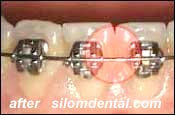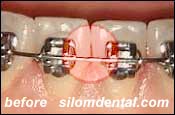 |
|
Air Flow
Bangkok, Thailand
Bangkok, Thailand
ORTHODONTICS l PERIODONTICS l PROSTHODONTICS
Periodontal disease is a chronic bacterial infection that affects the gums and the bone supporting the teeth. This infection may be influenced not only by oral health factors but also by other diseases like diabetes or cardio-vascular diseases. Smoking, stress and genetic factors may also support periodontal disease. Sometimes, the association between periodontal disease and other (systemic) diseases goes in both directions: this means that not only periodontal disease can be influenced by other diseases but that also periodontal disease might have a strong impact on the course of systemic diseases. If the plaque which contains the bacteria is not regularly removed through good oral health care and by professional means, an inflammation of the gums may be the result. The patient and/or the dentist can see that the gums are red, slightly swollen and bleed easily. This early form of periodontal disease is called gingivitis. Gingivitis can be reversed into a healthy state thanks to professional tooth cleaning followed by improved oral home care by the patient. As gingivitis does usually not cause particular discomfort for the patient, this condition does not cause him or her to see a dentist. Also, bleeding gums are traditionally considered as being quite "normal" and not recognized as the symptom of the disease. In some cases, even dentists do not diagnose gingivitis unless the patient complains about discomfort. If gingivitis is not treated, it can advance to periodontitis. Plaque and its bacterial population will go deeper and deeper down below the sulcus area. The inflammatory response of the body will cause the gums (and finally also the bone surrounding the teeth) to retract and separate from the teeth. Spaces between the gums and the teeth are formed, the so-called pockets. Even at this time, the patient may just feel minor discomfort. Too often, he or she will go and see the dentist only when the bone around the teeth has so much decreased that one or several teeth become loose. Following conservative estimates, more than 50% of the general population have gingivitis which already should be treated by the dentist (professional tooth cleaning). At least one third of the population suffers from a mild or advanced form of periodontitis. This means that the treatment need worldwide is enormous! It goes without saying that specialized periodontists play an important role, especially in severe cases. However, in order to give treatment to the very high number of people concerned by moderate forms of periodontal disease (including gingivitis), general practitioners and dental hygienists are indispensable. BEFORE & AFTER OF DENTAL AIR FLOW for ORTHODONTICS THIS DEVICE IS ALSO SUITABLE FOR REMOVAL OF ADHESIVE AFTER BRACKET DEBONDING
|
|

